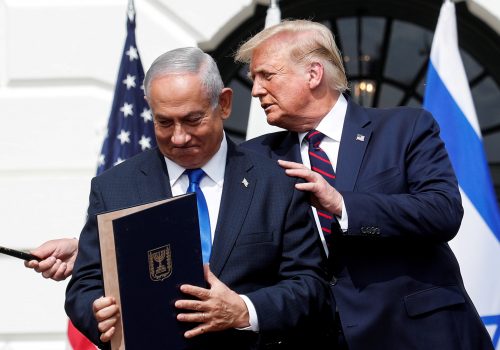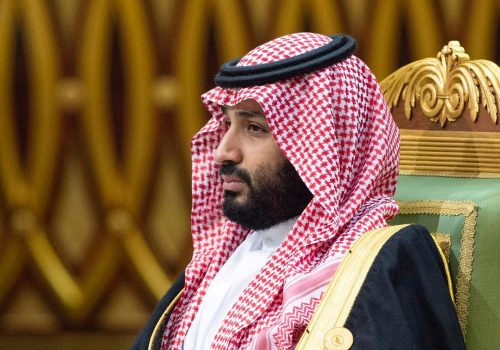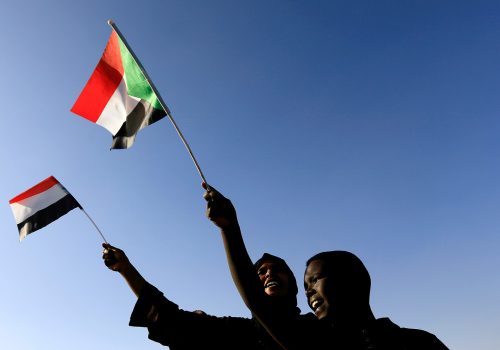Experts react: The US brokers another deal to end the Gulf rift
On January 4, it was reported that Saudi Arabia, Qatar, and other Gulf states are expected to sign a deal towards ending the “Gulf rift” —a political crisis that has divided the region since 2017, when Bahrain, Egypt, Saudi Arabia, and the United Arab Emirates (UAE) cut diplomatic ties with Qatar, alleging that the country supported terrorism. Kuwait’s foreign minister made a televised statement on Monday evening about the impending agreement, and announced that Saudi Arabia will open its borders and airspace with Qatar. The agreement is expected to be formally announced at the Gulf Cooperation Council (GCC) Summit, hosted in Saudi Arabia on January 5-6, in the final weeks of the Trump administration.
Atlantic Council experts react to the agreement and what it means for the wider region:
Jump to an expert reaction:
Barbara Slavin: Saudi Arabia’s gesture to an incoming Biden administration
Amjad Ahmad: An opportunity for economic diversification for the Gulf
Karim Mezran: The beginning of a more “sensitive” Gulf
Tom Warrick: The “Gulf rift” may be healing, but a “Washington rift” remains
Richard LeBaron: Easing the “Gulf rift” may relaunch normalcy—to the United States’ relief
Mark N. Katz: US sponsorship undercuts Moscow’s Middle East mediation role
Sina Azodi: As the GCC grows closer, Iran feels the pressure
Mohsen Tavakol: As Biden prepares to take the wheel, Gulf countries may signal cooperation hopes
Joze Pelayo: Bad news for Iran and Turkey
Nabeel Khoury: A step to put the GCC back on a more constructive path
Saudi Arabia’s gesture to an incoming Biden administration
“This is a gesture to the incoming Biden administration by Saudi Arabia, which expects an increase in tension with the United States over human rights, Yemen, and Iran. In a sense, it is very low hanging fruit. I doubt we will see a sudden increase in cooperation among the Gulf Cooperation Council (GCC) states, which have failed to even make their militaries compatible over the past forty years and which have divergent interests and relationships with external powers. However, anything that lessens tension in the region should be welcomed and let’s hope this leads to more diplomacy and fewer threats and acts of violence.”
Barbara Slavin, director of the Future of Iran Initiative at the Atlantic Council.
An opportunity for economic diversification for the Gulf
“The end of the blockade is an essential step toward GCC reconciliation and the cooperation required to face the political and economic challenges ahead. The driving force for ending the feud may be political and aimed to appease the incoming Biden administration as it plans to ramp up pressure on Saudi Arabia regarding human rights and potentially revisit the Iran deal. Still, one cannot ignore the significant economic benefits that this agreement could bring to all the players involved. Dialing down conflicts is a crucial building block to attracting investment to drive much needed economic diversification across the Gulf, especially for Saudi Arabia. In light of the economic decline and mounting debt of GCC countries, this agreement could not have come at a better time.”
Amjad Ahmad, director and resident senior fellow at empowerME, an initiative of the Atlantic Council’s Rafik Hariri Center for the Middle East.
The beginning of a more “sensitive” Gulf
“The end of the so-called ‘Gulf rift’ would constitute a major regional step forward. It will force the various states to adopt a foreign policy that is more attuned to the sensitivities of the other members and thus moderate eventual excesses. If reconciled with Qatar, the United Arab Emirates (UAE) will have to rethink its anti-Islamist obsession as well as its obsession in preventing the emergence of pluralistic governments in the Middle East and North Africa .”
“Another important development could be vis-a-vis the Iranian issue. Qatar’s connections with the Persian power are well known and could be used both as a means for an albeit timid rapprochement or as further pressure to force Iranian compliance.”
Karim Mezran, director of the North Africa Initiative and resident senior fellow with the Rafik Hariri Center and Middle East Programs.
The “Gulf rift” may be healing, but a “Washington rift” remains
“Many people have already forgotten that the ‘rift’ started in 2017 with serious policy differences over how the countries of the Gulf should treat the Muslim Brotherhood and groups contending for influence in the Syrian civil war. As the rift begins to heal with this new announcement, the underlying differences have not really been resolved. The parties, at least, have agreed to end the rift’s more visible and disruptive effects.”
“For the attention given to the rift by Gulf and US officials, very little attention was given, even in Washington, to the ‘other’ rift—the one between US Secretary of State Rex Tillerson and the voices in the 2017 Trump White House who wanted to push for changes in other countries’ policies towards groups like the Muslim Brotherhood. The Trump administration’s need for solidarity against Iran trumped those who wanted to ‘do something’ about the Muslim Brotherhood.”
“It is an important part of President Trump’s legacy in the Middle East that the 2017 Trump White House could not figure out a diplomatic path towards achieving the goals it set for itself. In a few weeks, the last of the architects of this policy will leave the executive branch with very little to show for the Washington ‘rift’ that disrupted millions of lives.”
Tom Warrick, nonresident senior fellow with the Atlantic Council’s Middle East Programs and director of the Future of DHS Project at the Atlantic Council.
Easing the “Gulf rift” may relaunch normalcy—to the United States’ relief
“Discerning the motives and incentives for action at this time by the players in the Gulf is not easy. I will thank the Kuwaitis for doing the hard work of talking down the parties. This was a conflict that the United States did not need, and it will be good to see it brought back to its normal level of mutual recriminations. Much like normalization with Israel, the emphasis should be on ‘normal’—this détente is nothing particularly special.”
Richard LeBaron, nonresident senior fellow at the Atlantic Council and former US Ambassador to Kuwait.
US sponsorship undercuts Moscow’s Middle East mediation role
“For Moscow, the Saudi-Qatari reconciliation may be unwelcome if it means that Riyadh and Doha are now less willing to invest in and trade with Russia as a means of competing with each other for its favor. Emirati-Qatari and Bahraini-Qatari reconciliations, which may follow after the Saudi-Qatari one, would have a similar effect. US sponsorship of normalization agreements or reconciliations between various Middle Eastern states undercut Moscow’s claims that Russia is a better Middle East mediator than the United States.”
Mark N. Katz, nonresident senior fellow with the Atlantic Council’s Middle East programs.
As the GCC grows closer, Iran feels the pressure
“Given that Iran supported Qatar after the blockade and tried to take advantage of the feud among the Arab countries of the region, I think this rapprochement will come as bad news for Iran, which increasingly sees itself isolated and under pressure. Just recently, both the UAE and Bahrain normalized relations with its adversary, Israel. A united GCC will not be to Iran’s benefit.”
Sina Azodi, nonresident fellow with the Atlantic Council’s Middle East programs.
Don’t bet on conflict resolution; geopolitical dynamics unlikely to see significant change
“The ripple effect of the GCC internal rivalries has been central to the proxy dynamics that have underpinned and shaped the outcomes of political and military developments across the Middle East and North Africa since the revolutions of 2011. Despite the purported rapprochement between Gulf parties, it is worth noting that this is seemingly influenced by a desire to pre-empt pressure from an incoming Biden administration, more than a genuine commitment to conflict resolution. As such, the détente within the GCC is very unlikely to significantly affect geopolitical dynamics beyond the Gulf.Third party states such as Libya, Tunisia, Sudan, Morocco, and Egypt—to name but a few—will remain theaters where Gulf players and their allies will continue their proxy interventionism in their scramble to settle geopolitical scores.”
Emadeddin Badi, nonresident senior fellow with the Atlantic Council’s Middle East programs.
As Biden prepares to take the wheel, Gulf countries may signal cooperation hopes
“By ending the blockade against Qatar, the involved countries may be sending a message to the incoming Biden administration that they are willing to cooperate with a new Middle East policy when Biden sits behind the wheel, as he is expected to take a more peace-oriented and compromising approach in the region. The rapprochement does not necessarily mean that Qatar will sever or even significantly decrease its ties with Iran. On the contrary, Iran may—through its relationship with Qatar—establish another channel, in addition to Oman, for possible behind-the-scenes dialogue with Saudi Arabia. Inviting senior White House advisor Jared Kushner to the signing event is perhaps a friendly gesture to Trump to avoid burning bridges.”
Mohsen Tavakol, nonresident senior fellow with the Atlantic Council’s Middle East programs.
Bad news for Iran and Turkey
“Despite the mistrust that is likely to remain between the two sides, this is a step in the right direction that also signals bad news for Iran and Turkey given their regional ambitions. Will other countries such as the UAE and Bahrain follow through? It’s not yet certain, but H.E. Anwar Gargash, UAE Minister of State for Foreign Affairs, stated Monday that he expects the GCC summit this week to “restore Gulf cohesion.” Saudi Arabia’s Al Ula, formerly a trade capital and an example of the Gulf’s deep-rooted and shared history, will now appropriately host one of the most significant summits in the Gulf to restore regional unity. The choice of Al Ula is indeed culturally symbolic, and it is also part of Saudi Arabia’s effort to draw international attention to the site as a cultural hub in the region.”
Joze Pelayo, program assistant at the Atlantic Council’s Scowcroft Middle East Security Initiative.
A step to put the GCC back on a more constructive path
“Any reduction of tension and reopening of borders in an overly tense regions is a relief and can hopefully lead to an improvement. I am skeptical however that this is more than a gesture under pressure from the ‘Arab coalition’ within the GCC, which has not fared well since their boycott of Qatar. The issues originally listed as points of contention by Saudi Arabia are still unresolved. To wit, Qatar’s relations with the Muslim Brotherhood, Taliban, the Houthis, not to mention Hamas, have not changed. Oh, and of course, al-Jazeera has not been shut down.”
“Three years of economic pressure have failed to enforce patently unreasonable and impractical demands. Two alternative outcomes are possible: A compromise could be reached on the real issues of contention, or Qatar could convince Saudi Arabia and the UAE to accept its approach to conflict resolution in the region.”
“The most likely scenario in this case, especially given the expected policies of the incoming administration in the US, is to start by ending the war and lifting the siege on Yemen. Qatar, along with Oman stand ready, willing and able to put an end to the worst humanitarian tragedy in modern history and put the GCC back on a more constructive path.”
Nabeel Khoury, nonresident senior fellow with the Atlantic Council’s Middle East programs.
Further reading:
Sign up for all the latest updates!
Sign up for the MENASource newsletter, highlighting pieces that follow democratic transitions and economic changes throughout the region.
Image: Qatar's ruler, Emir Sheikh Tamim bin Hamad al-Thani, gives a speech to the Shura Council in Doha, Qatar, November 3, 2020. Qatar News Agency/Handout via REUTERS ATTENTION EDITORS - THIS PICTURE WAS PROVIDED BY A THIRD PARTY.


